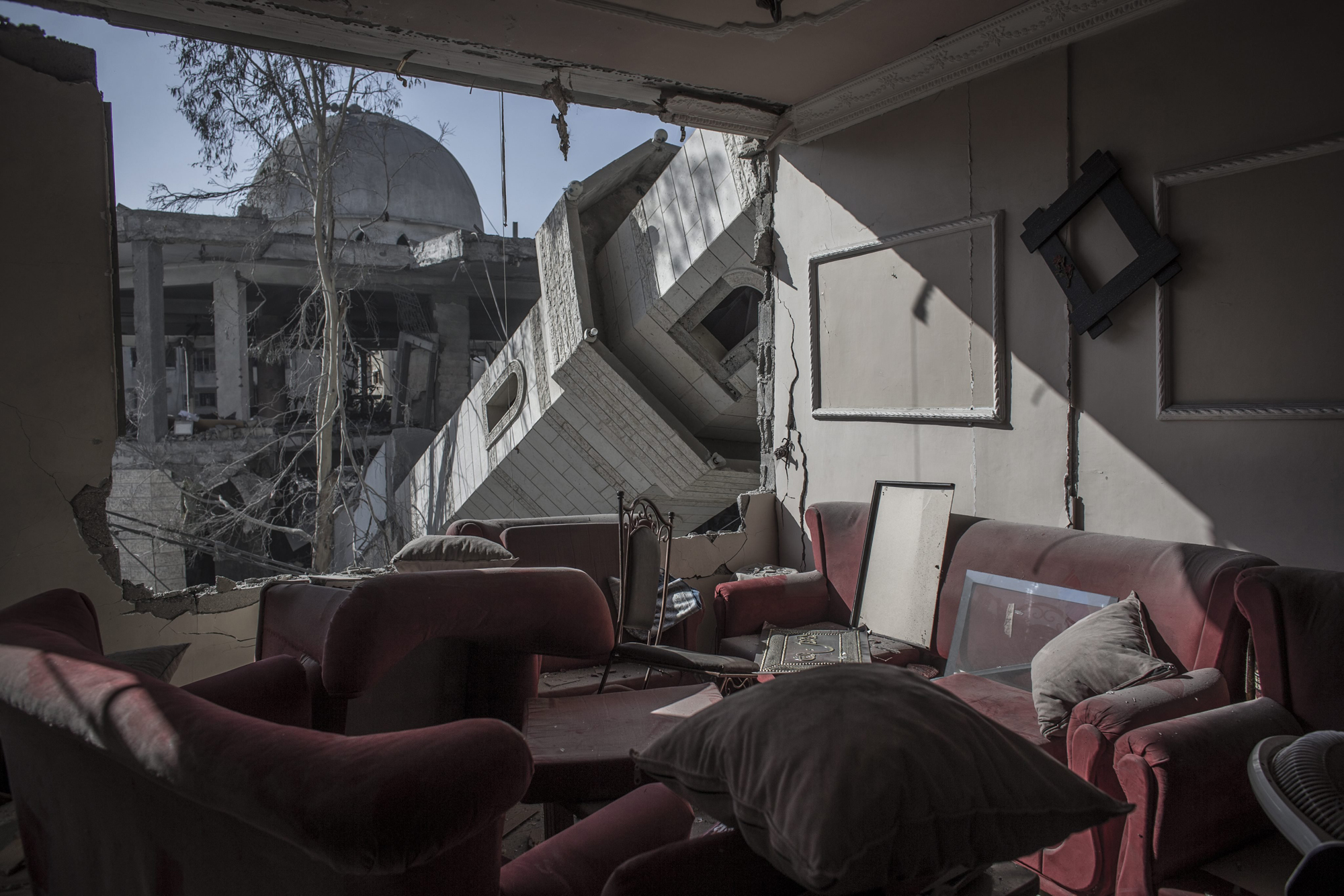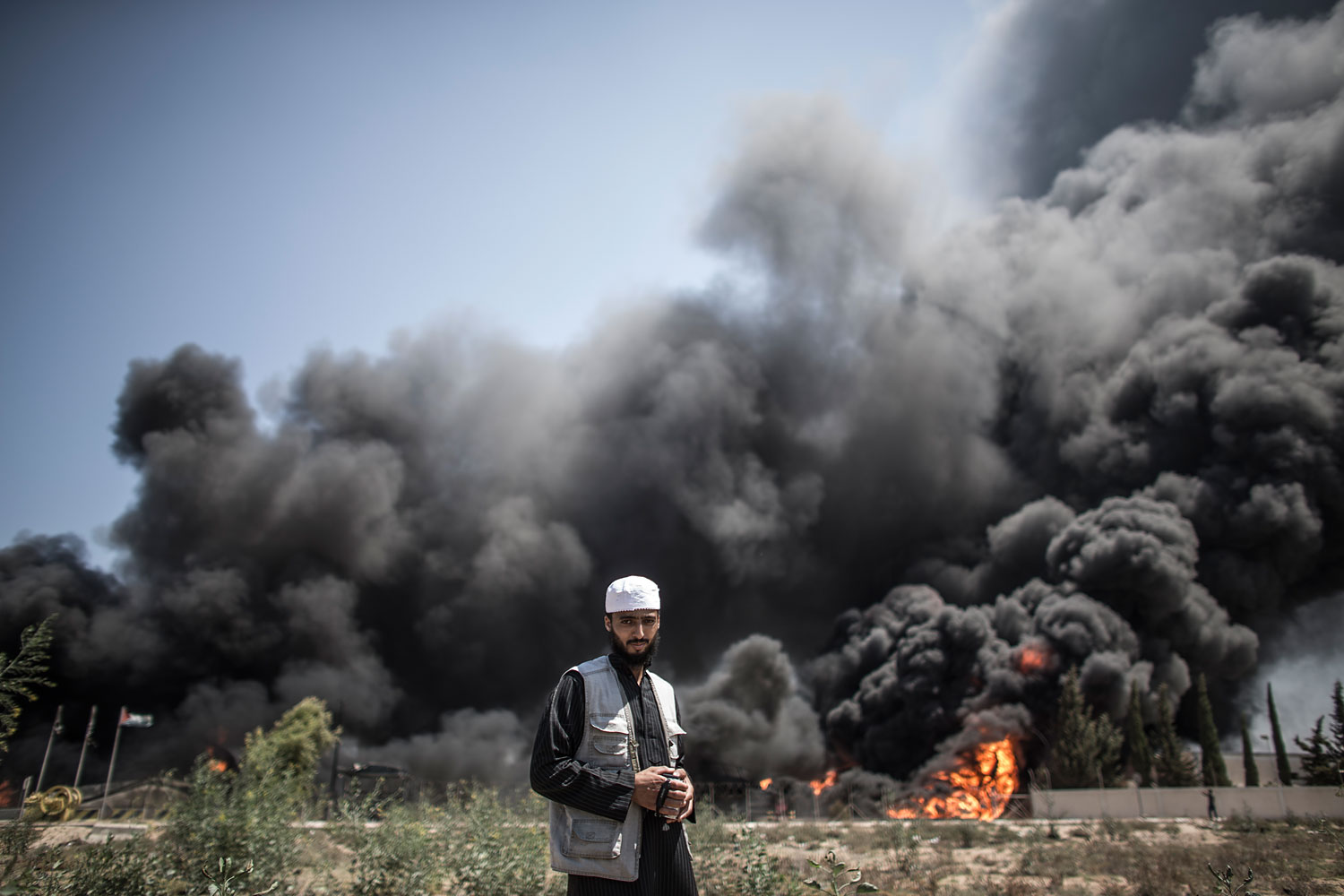
Updated July 30, 6:06 a.m. ET
Israeli officials have said in the past week that their main goal in the war against Hamas in Gaza is to destroy as many of what it calls “terror tunnels,” the underground passages built by the militant group that have repeatedly been used to infiltrate Israel. But following a day in which Hamas militants managed to kill 10 Israeli soldiers, Israel responded Tuesday with massive air strikes that seemed aimed at both major infrastructure as well as the visible symbols of Hamas’s power in the Gaza Strip.
In overnight strikes on Monday by aircraft, tanks and navy gunboats, the Israeli Defense Forces (IDF) attacked 150 targets in Gaza, including the home and office of Hamas political chief Ismail Haniyeh’s home, the influential Shujaiyeh battalion commander’s home and the Ministry of Finance, as well as al-Aqsa Radio and al-Aqsa Television, two media outlets operated by Hamas. The IDF said it attacked two Hamas command centers and four weapons-storage sites hidden inside mosques and a tunnel Tuesday, before targeting five mosques overnight where it said Hamas had hidden weapons.
Most prominently, it struck Gaza’s main power plant, all but destroying it. “The plant wasn’t working fully in the past few months due to shortages of fuel that comes from Israel,” Rafeeq Abu Maliha, the plant’s director, told reporters. “Three days ago Israel started to hit the station. The first time one missile hit the water and cooling engine. The second air strike they hit the administration building. Last night’s strike was on [a] streaming engine, and in the morning today the tanks of fuel were hit and caused a huge fire in the station.” Gaza has been suffering from severe shortages of power for years,” he said, and many areas of the power plant hit over the course of the war were not currently repairable because of “access difficulties.”

A spokesman for the Israel Defense Forces denied the power station had been on Israel’s hit-list. “The power plant definitely was not a target,” Lt. Col. Peter Lerner tells TIME. “We checked with all the forces in the area, air, ground and naval, and we’ve not been able to determine that the IDF has carried out this strike. It could be a Palestinian mortar hit it – we don’t know.” He said the IDF was “looking into” the incident.
Tunnels and rockets are easy for Israel to explain as military targets — both directly threaten Israeli citizens. But if it did intentionally hit the power plant, as well as government and communications buildings, it might indicate that Israel is taking its Operation Protective Edge to a far more punishing level — a move some more conservative members in Israeli Prime Minister Benjamin Netanyahu’s government have long advocated. Economy Minister Naftali Bennett of the influential Jewish Home party on Tuesday said that simply destroying Hamas’ tunnel network isn’t enough, and called on Israel to continue the operation until Hamas loses control. “Hit Hamas without mercy,” Bennett said. “Day and night. On weekdays and holidays. Without respite and without rest. Until they are defeated.”
Whether or not the more conservative Bennett represents the mainstream thinking of the Israeli government, he’s been able to repeatedly make strong statements without a public reprimand from Netanyahu. What seems clear is that the Israeli government and the top political brass fall into two camps: those who see the war ending with the goal of deterrence — hurting Hamas’ military capabilities and making them think twice before launching another rocket once a meaningful cease-fire is actually reached — and those who are gunning for destruction, whether by bringing Hamas to its knees or by managing to overthrow it altogether.
But Talal Okal, an independent Palestinian analyst who lives in Gaza, argues that an extended bombing campaign would be unlikely to topple Hamas. On the contrary, the destruction being broadcast from Gaza will only underscore the need for the kind of international rebuilding efforts that can only be achieved by lifting the embargo on the strip — which happens to be a main demand of Hamas. “I don’t think the Israeli targeting of infrastructure will push Hamas to collapse, but it will be an extra reason to insist to make removing the siege that was imposed seven years ago,” he says. “Everyone suffers from it, Hamas people and ordinary Gazans.
“But at the same time it might push the people to trend more toward finding a political solution soon, as the war is more tiring by the day. I think people are actually supporting Hamas more than in previous wars as there are dead [Israeli] soldiers” for Hamas to point to as a tangible achievement, he explains. “The loss is not only in Gaza but also in Israel, so that would make the people here able to survive and stand more.”
No one doubts that the conditions in Gaza have become extreme. The loss of electricity is causing water shortages and sanitation challenges. The electricity lines along the main street of Gaza City are down entirely, as well as in frontline areas like Shujaiya, Beit Hanoun, Zaitoun and the east of Khan Younis. With no electricity available to charge phones and with many land lines cut by IDF strikes, it is becoming hard for many Gazans to so much as place a phone call to check on a relative or call an ambulance in the event of an emergency.
“Since last night we have been hearing shelling and bombs in the area of the plant, and we’ve had no electricity for three days now,” says Yasser Bakheet, 28, a resident of Nussirat, a neighborhood near the power plant. As much as a missile strike, he now fears an ongoing humanitarian disaster and the outbreak of disease in Gaza. “I don’t care about politics,” he says. “What I care about now is to live normally or at least get the basic needs for me and my family.”
Late Tuesday, the latest diplomatic efforts raised hopes that a cease-fire could be on the horizon. But Mohammed Deif, the head of al-Qassam Brigades, the military wing of Hamas, said in broadcast comments that there would be no truce in Gaza unless Israel lifts its “siege.” Fighting continued overnight, with a UN school in the Jabaliya refugee camp attacked and at least 15 Palestinians killed. Tuesday was the deadliest day in the conflict so far, a Gaza health official told the AP. A war that was billed as an operation to halt Hamas rocket fire seems no closer to resolution than when it started three weeks ago.
— With reporting by Hazem Balousha / Gaza City
More Must-Reads from TIME
- Donald Trump Is TIME's 2024 Person of the Year
- Why We Chose Trump as Person of the Year
- Is Intermittent Fasting Good or Bad for You?
- The 100 Must-Read Books of 2024
- The 20 Best Christmas TV Episodes
- Column: If Optimism Feels Ridiculous Now, Try Hope
- The Future of Climate Action Is Trade Policy
- Merle Bombardieri Is Helping People Make the Baby Decision
Contact us at letters@time.com